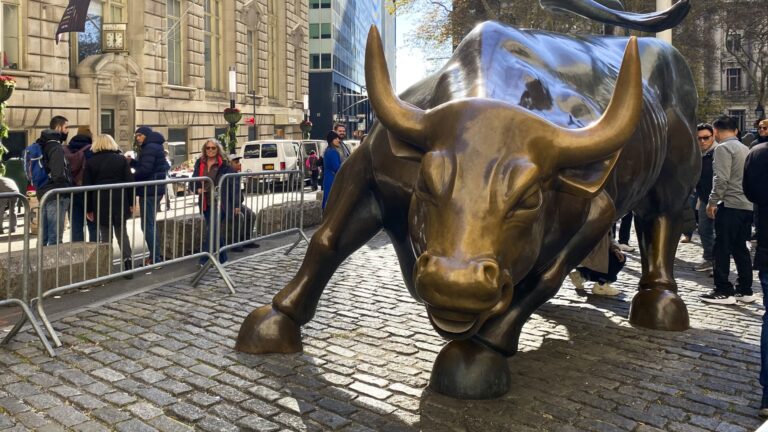Global tech stocks rallied Thursday as investors piled back into AI-related names, buoyed by Nvidia earnings.
Nvidia topped forecasts for revenue, which jumped 62% to $57.01 billion year-on-year, and issued stronger-than-expected fourth-quarter sales guidance, giving investors the confidence they were looking for to continue placing bets on the AI industry. Shares were 5% higher in premarket trade.
In Europe, Dutch semiconductor firms BESI and ASMI moved up over 3% and 2% in the first hours of trading, respectively. ASML, which makes critical equipment for semiconductors, gained 2.1%.
Asia-listed stocks Samsung Electronics and Hon Hai Precision Industry, also known as Foxconn, climbed 3.5% and 3.3% higher, respectively.
Stateside, investors flocked to tech stocks in premarket trade: AMD rose 5%, Arm gained almost 4%, Micron Technology advanced 2.7%, Marvell Technology added 3.3%, Broadcom was last seen 3.1% up and Intel moved 2% higher.
‘Phenomenal growth’
Dan Hanbury, global equity portfolio manager at Ninety One, which holds Nvidia as its second-largest holding in its global strategic equity fund, cautiously welcomed Nvidia’s share price jump in Thursday’s premarket trade.
“As a holder, it’s great to see an early positive reaction but of course as we know those reactions can reverse further into the day,” Hanbury told CNBC’s “Squawk Box Europe.”
“Our reading of the numbers is they are very strong. Clearly, we can get caught up in the quarterly noise of a company like this but if we just put those [numbers] in context … only three years ago they were delivering $15 billion of data center revenue, we’re now looking at consensus forecasts into next year of $280 billion,” Hanbury said. “That is phenomenal growth that these guys are delivering.”

Karen McCormick, chief investment officer at London-based venture capital company Beringea, spoke with CNBC’s “Squawk Box Europe” about some of the recent moves to bulk-up on AI and scale, particularly following Nvidia and Microsoft‘s recent push to invest up to $15 billion in OpenAI rival Anthropic.
“It’s always a little bit intimidating to contradict Jensen Huang right after he has made phenomenal earnings results but in terms of the almost incestuousness of the valley and the AI companies, it is more than we have seen in the past,” McCormick said.
“I mean, if you think about traditionally, we might have called something like this vendor financing, where your vendor is helping to support the business,” McCormick said. “In this case we are just doing it with hundreds of billions of dollars and the ecosystem itself is now so intertwined that it’s almost a little bit nerve-wracking because if we are in a bubble and if any of that bubble bursts, what is going to happen to all of the related businesses?”
‘Nowhere near as bad as 1999’
The culmination of circular dealmaking, debt issuances and high valuations added pressure to the market ahead of Nvidia’s much-anticipated results, despite other Big Tech firms posting solid quarterly earnings.
“The flip side to that is that each of them has incredibly robust balance sheets and incredibly robust investors, who may not let them fail either way,” McCormick said.
Quilter Cheviot’s global head of technology research and investment strategist Ben Barringer, added that Nvidia’s valuation isn’t “particularly excessive.”
Valuations aren’t that streteched when you look at the core big tech companies, he told CNBC’s “Europe Early Edition” on Thursday.
In terms of debt that’s also at the peripheral, he said. While Meta and Amazon have raised debt, “they’re still net cash positioned,” Barringer added.
“I think it’s more about them managing their treasury position and managing their balance sheet, as it were. Yes, it’s not great that they are doing some of this capex from debt, but it’s nowhere near as bad as 1999 where these were very heavily levered telecom companies doing a lot of this capex.”
However, Gil Luria, head of technology research at D.A. Davidson, told CNBC on Thursday that Nvidia is not a bubble barometer. “The concern is about companies raising a lot of debt to build data centers,” he said.
“Any concerns about Nvidia were certainly laid to rest [with Nvidia’s earnings], but that doesn’t mean that we don’t need to keep an eye on companies lending or borrowing to build data centers,” Luria added.
— CNBC’S Sam Meredith contributed to this report

